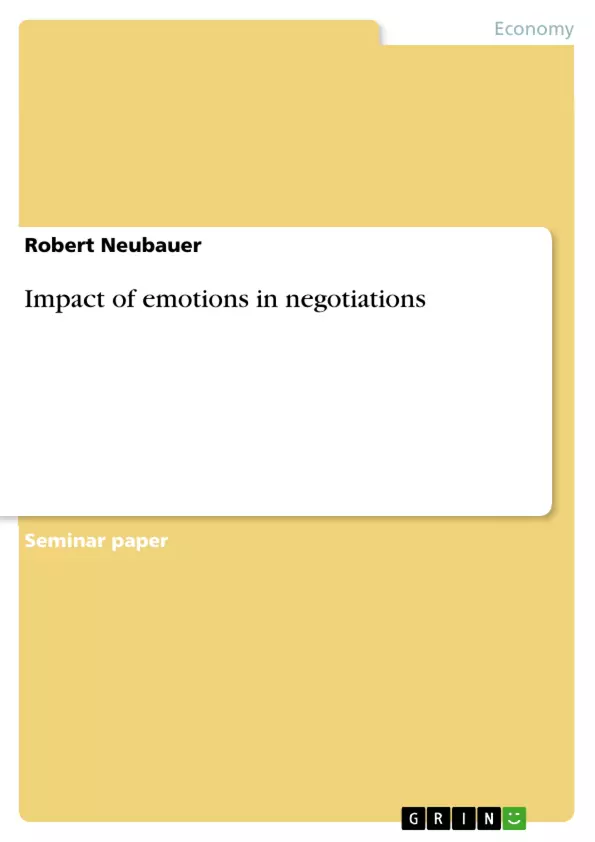This seminar paper deals with emotions in negotiations. Both the negotiator and the opponent can use emotions in negotiations in order to influence the result to their own advantage. Emotions can be divided into positive, negative and neutral. Within these three types of emotions, there are different emotions that can occur, whereof not all of them has the same impact on the outcome of the negotiation.
Based on a systematic literature analysis, the emotions that can occur within these three types are presented and illustrated. This seminar gives an overview of the impact of the three types of emotions in negotiations and is specifically focused on the positive emotions compassion and happiness, as well as the negative emotions anger, anxiety and sadness. The aim of this work is to compare critically and objectively the different effects of the emotions in negotiations.
Inhaltsverzeichnis (Table of Contents)
- Abstract
- List of figures
- Introduction
- Negotiation and emotion
- Definition of negotiation
- Negotiation strategies
- Definition of emotion
- Types of emotions
- Impact of emotions in negotiations
- Positive emotions
- Negative emotions
- Neutral emotions
- Summary and outlook
- Literature
Zielsetzung und Themenschwerpunkte (Objectives and Key Themes)
This seminar paper aims to provide a comprehensive overview of the role of emotions in negotiations. The paper examines how negotiators and their opponents can strategically utilize emotions to influence the outcome of negotiations. The work analyzes the impact of positive, negative, and neutral emotions on negotiation dynamics, focusing specifically on compassion, happiness, anger, anxiety, and sadness.
- Strategic use of emotions in negotiations
- Impact of different emotion types on negotiation outcomes
- Analysis of positive emotions (compassion, happiness)
- Analysis of negative emotions (anger, anxiety, sadness)
- Critical and objective comparison of emotional effects in negotiations
Zusammenfassung der Kapitel (Chapter Summaries)
- Introduction: This chapter introduces the concept of negotiation as a reciprocal communication process aiming to reach an agreement despite opposing interests. The importance of emotions in negotiation decision-making is highlighted, drawing on research that indicates the influence of emotional displays on negotiation outcomes. The paper outlines the three types of emotions: positive, negative, and neutral, providing examples of emotions within each category. The chapter concludes by posing the key question of how different types of emotions influence the outcome of negotiations, setting the stage for the subsequent analysis.
- Negotiation and emotion: This chapter delves deeper into the concept of negotiation, defining it as a process of reaching agreements through communication and compromise. It discusses various negotiation strategies and the role of emotional intelligence in negotiation success. The chapter further examines the concept of emotion, exploring its definition and the diverse types of emotions that can arise in negotiation settings.
- Impact of emotions in negotiations: This chapter explores the influence of different emotions on negotiation dynamics, analyzing the impact of both positive and negative emotions. It examines how positive emotions, such as compassion and happiness, can contribute to a collaborative and constructive negotiation environment. Conversely, the chapter explores how negative emotions, such as anger, anxiety, and sadness, can hinder communication and lead to less favorable outcomes. Finally, it examines the role of neutral emotions in negotiation, where the absence of emotional expression may be interpreted in different ways.
Schlüsselwörter (Keywords)
This seminar paper focuses on the key concepts of emotions and their strategic use in negotiations. It explores various types of emotions, including positive (compassion, happiness), negative (anger, anxiety, sadness), and neutral emotions. The paper analyzes the impact of these emotions on negotiation outcomes, emphasizing the importance of emotional intelligence and its role in achieving favorable results.
Frequently Asked Questions
How do emotions influence negotiation results?
Emotions can be used strategically to influence an opponent's perception and behavior, potentially leading to better or worse outcomes depending on the type of emotion displayed.
What is the impact of anger in a negotiation?
Anger is a negative emotion that can sometimes lead to concessions from the opponent but often damages long-term relationships and hinders constructive communication.
Can happiness improve negotiation outcomes?
Yes, positive emotions like happiness and compassion tend to create a collaborative environment, foster trust, and encourage integrative solutions where both parties benefit.
How does anxiety affect a negotiator?
Anxiety often leads to lower confidence, quicker concessions, and a tendency to exit negotiations early, which usually results in less favorable terms.
What is the role of emotional intelligence in negotiations?
Emotional intelligence helps negotiators recognize and manage their own emotions while accurately interpreting the opponent's emotional cues to adapt their strategy effectively.
- Citar trabajo
- Robert Neubauer (Autor), 2017, Impact of emotions in negotiations, Múnich, GRIN Verlag, https://www.grin.com/document/366665



